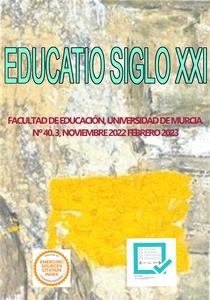Learning and Adaptation During the Covid-19 Pandemic: Colleges of Education as Hubs for Leadership and Innovation
Abstract
The Covid-19 pandemic greatly disrupted educational systems around the world. Given their extensive stakeholder network, Schools and Colleges of Education played an important role in providing leadership across all dimensions of education throughout the pandemic. This paper presents results from an interview based study of Deans of Schools of Education in the United States with a special focus on how they sought to address issues of diversity, equity and inclusion throughout the pandemic. Results show that while there was a great deal of variability in the responses of Deans and Schools of Education many promising practices emerged that are potentially scalable and shareable to other institutions.
Downloads
-
Abstract763
-
PDF (Español (España))440
References
Brenner, M. E. (2006). Interviewing in educational research. In J. L. Green, G. Camilli & P. B. Elmore (Eds.), Handbook of complementary methods in education research (3rd Ed.). Erlbaum.
Brom, C., Lukavský, J., Greger, D., Hannemann, T., Straková, J., & Švaříček, R. (2020). Mandatory home education during the COVID-19 lockdown in the Czech Republic: A rapid survey of 1st-9th graders' parents. Frontiers in Education, 5. http://doi.org/10.3389/feduc.2020.00103.
Cochran-Smith, M. (2010). Toward a Theory of Teacher Education for Social Justice. In Hargreaves, A., Lieberman, A., Fullan, M., Hopkins, D. (eds), Second International Handbook of Educational Change (Springer International Handbooks of Education, 23, pp. 445-467). Springer. https://doi.org/10.1007/978-90-481-2660-6_27
Corbin, J., & Strauss, A. (2014). Basics of qualitative research: Techniques and procedures for developing grounded theory. Sage.
De Wit, H. (2002). Internationalization of higher education in the United States of America and Europe: A historical, comparative, and conceptual analysis. Greenwood Publishing Group.
Fraser, N. (2008). Abnormal justice. Critical inquiry, 34(3), 393-422. Sage.
Miles, M. B., & Huberman, A. M. (1994). Qualitative data analysis: An expanded sourcebook. Sage.
Quezada, R. L., Buczynski, S., Medina, R. A., Stolz, S., Fabionar, J. O., & Jez, R. (2020). Editors’ Introduction: Teacher Identity. Teacher Education Quarterly, 47(3), 3-8. https://www.jstor.org/stable/26977512.
Quezada, L. R. Talbot, C., Parker-Quezada, B., K. (2020). From bricks and mortar to remote
teaching: A teacher education programme’s response to COVID-19. Journal of Education for Teaching, 3, pp. 472-483. https://doi.org/10.1080/02607476.2020.1801330.
Rawls, J. (1971). A theory of justice. Harvard University Press.
Rogers, P. M. (2008). The development of writers and writing abilities: A longitudinal study across and beyond the college-span. (Doctoral dissertation), Available from ProQuest Dissertations and Theses database (UMI No. 3319795).
Saldaña, J. (2021). The coding manual for qualitative researchers. Sage.
Sen, A. (1990). Justice: Means versus Freedoms. Philosophy & Public Affairs, 19(2), 111-121. http://www.jstor.org/stable/2265406
Yin, R. K. (2015). Qualitative research from start to finish. Guilford publications.
Copyright (c) 2022 Servicio de Publicaciones de la Universidad de Murcia

This work is licensed under a Creative Commons Attribution-NonCommercial-NoDerivatives 4.0 International License.
Original work publishes in this journal is subject to the following terms:
1. Murcia University Press (the publishing house) holds the copyright of the publishes work, and favours and allows their reutilization under the use license stated in point 2.
© Servicio de Publicaciones, Universidad de Murcia, 2015
2. Work is published in the electronic edition under a license (Creative Commons Reconocimiento-NoComercial-SinObraDerivada 4.0 España (legal text). They can be copied, used, disseminated, transmitted and publicly presented, as long as: i) authorship and original publication source is acknowledged (journal, publishing house and URL of the work); ii) are not used for commercial purposes; iii) the existence and specifications of this use license is stated.
3. Conditions for self-archive. Authors are allowed and encouraged to disseminate electronically the pre-pint (before review) and/or post-print (accepted for publication) versions of their work before their publication since that favours earlier circulation and dissemination resulting in an increased chance for the authors to be cited and for the work to reach a bigger share of the academic community. Colour: RoMEO: green.








